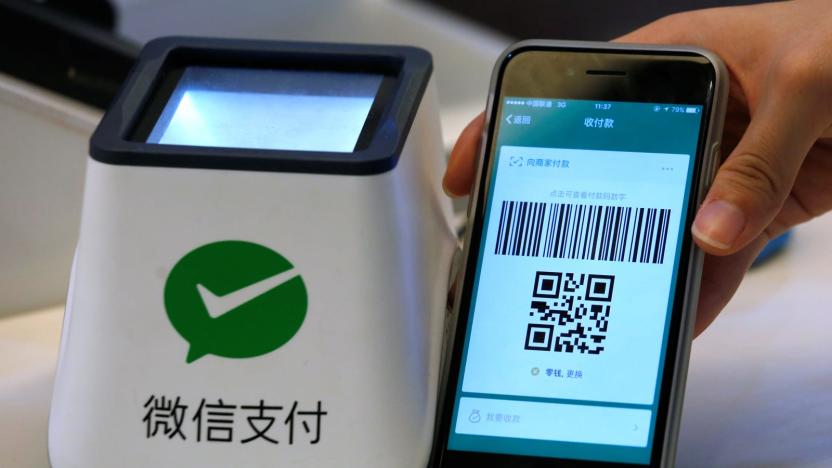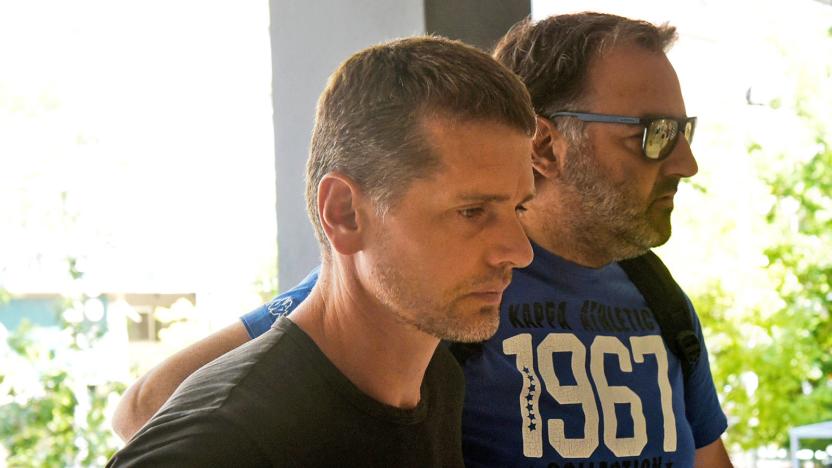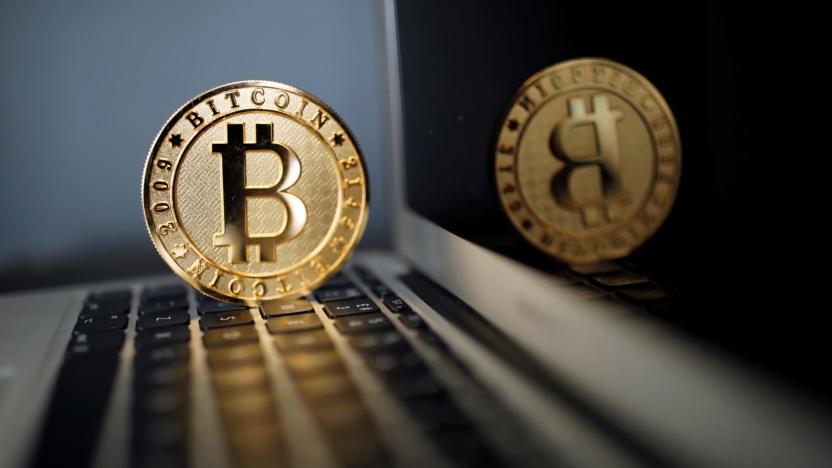MoneyLaundering
Latest

Backpage.com officials indicted following FBI shutdown
Last week, the US government seized the classified website Backpage.com, disabled it, and replaced its front page with a disclaimer announcing its shutdown. The site's cofounders had been the subject of law enforcement investigations into pimping, sex trafficking and money-laundering over the years. Today, a grand jury in Phoenix indicted seven officials associated with the website with alleged money laundering and facilitating prostitution.

China will cap QR-code payments to tackle fraud
China's central bank is issuing regulations over QR-code-based payments. Paying for things by scanning a barcode with the Alibaba or WeChat app is more common than using cash in the region and now the government wants to keep closer tabs on where the money is going. You might laugh at the idea, but QR codes aren't the punchline in the east that they are here. For instance, plenty of cabbies prefer taking QR payments because it means they don't have to handle small change.

Airbnb is reportedly being used to launder money
Criminals have long been exploiting online marketplaces for money laundering purposes, and the latest service to reportedly fall prey to fraudsters is Airbnb. According to a Daily Beast report, Russian scammers are leveraging the service to launder dirty cash from stolen credit cards with the help of corrupt hosts. The fraudsters are recruiting for their Airbnb abuses on Russian-language crime forums, with posts seeking everything from collaborators to hacked accounts.

Russian charged over $4 billion bitcoin laundering scheme
The US Department of Justice (DoJ) has charged a Russian Bitcoin exchange operator with 17 counts of laundering up to $4 billion since 2011. Alexander Vinnik was arrested earlier this week by Greek police, and shortly afterwards, security firm Wizsec identified him as a prime laundering suspect in the infamous $480 million Mt. Gox hack. "BTC-e was an international money-laundering scheme that, by virtue of its business model, catered to criminals -- and to cyber criminals in particular," the DoJ's indictment reads.

Arrested Bitcoin exchange leader might be linked to Mt. Gox theft
Greek authorities arrested a leading member of the BTC-e Bitcoin exchange on suspicion of money laundering, though the ultimate charges haven't been disclosed. That's because the person in question -- a Russian citizen named Alexander Vinnik -- was detained at the request of US authorities, which suspect he laundered as much as $4 billion through the platform.

Russia hopes legitimizing Bitcoin will thwart crooks
Russia's existing stance on bitcoin and other digital currencies is... less than welcoming. You could face website bans and prison time just for using it. However, the country is making an about-face on the idea. Deputy Finance Minister Alexey Moiseev tells Bloomberg that Russia hopes to recognize cryptocurrencies in 2018. Officials still have to determine how they will categorize this virtual money (assets? Cash? Securities?) sometime in mid-2017, but it's now more a question of "when" than "if." Of course, this isn't a purely benevolent move -- it's really about cutting back on crime.

Backpage.com execs hit with pimping and money laundering charges
California Attorney General Kamala Harris has renewed the case against the co-founders of online classifieds site Backpage.com. Earlier this month, a judge in Sacramento County threw out pimping and sex trafficking charges against three of the site's executives, citing Section 230 of the Communications Decency Act, which protects online service providers from illegal activity committed by users of their site. On Friday, however, Harris announced her office is pursuing 13 new charges of pimping and conspiracy to commit pimping as well as 26 counts of money laundering against the site's execs.

Australia will track online money laundering and cyber fraud
Australia outlined its cyber security strategy earlier this year and now we have a better idea of what it entails. In an effort to figure out where funding for cyberterrorism comes from, the country has launched a program to keep track of money laundering and online financial fraud, according to Reuters. The key directive, at least at this point, is to intercept job listings that trick people into illegally moving money between one jurisdiction and the next.

Another Silk Road spy pleaded guilty to laundering bitcoins
$820,000. That's how much former Secret Service agent Shaun Bridges pilfered in bitcoin during his time investigating the online black market, Silk Road. Bridges pleaded guilty to money laundering and obstruction of justice recently and the Department of Justice says that it was analyzing the "block chain and data" from Silk Road's servers that lead the breadcrumb trail of ill-gotten gains back to him. Bridges funneled his 20,000 bitcoins, at that time worth $350,000, through a series of "complex transactions" with a stop at Mt. Gox before transferring them into US dollars in early 2013. It isn't nearly as flagrant as his colleague Carl Force's transgressions (a movie deal? Seriously?), but the amount of money Bridges tried stealing was an awful lot higher.

Hackers set to release Bitcoin-laundering app 'Dark Wallet'
Ever since sites like Silk Road showed the dark side of anonymous Bitcoin transactions, governments have been trying to regulate the crypto-currency. But a group of coders -- headed by 3D-printed gun creator Cody Wilson and Amir Taaki (above) -- want to keep that genie out of the bottle with a new app called Dark Wallet. It was first launched on Indiegogo, where it met its $50,000 funding goal, thanks in part to Bitcoin donations. The software could make it nearly impossible to trace the currency's flow, thanks to a one-two punch of encryption and "CoinJoin" technology. In brief, the latter code registers multiple transactions as a single movement of funds, masking transfers.

Former Apple employee admits he sold confidential info, cost the company in excess of $2 million
Paul Devine, the man who last August collected a pretty lengthy list of charges against his name from the FBI and IRS -- which collectively amounted to an accusation of "screwing Apple" -- has now admitted his guilt. Specifically, Devine has fessed up to wire fraud, conspiracy and money laundering, in which he engaged while exchanging confidential information about upcoming Apple products for cold hard cash from interested parts suppliers. He's now having to forfeit $2.28 million in money and property that resulted from his nefarious exploits, with sentencing scheduled for June 6th. Devine's lawyer is quoted as saying he's a "good man who made a mistake, and now he's trying to make amends." Indeed, the mistake of getting caught and the amends of trying not to go to prison. Jump past the break for a full statement on the matter from the US Department of Justice.

Apple supply manager arrested for wire fraud, money laundering
Ever wonder why -- after years of secrecy -- camera-ready iPod cases began rolling out? The answer could possibly be Apple supply manager Paul Shin Devine, who was just fingered by the FBI and IRS as a fraudulent, money laundering mole. Devine was arrested Friday for allegedly receiving kickbacks from six accessory suppliers in exchange for confidential information, which apparently gave them an edge in negotiating Apple contracts. "The alleged scheme used an elaborate chain of U.S. and foreign bank accounts and one front company to receive payments," reports the San Jose Mercury News, "and code words like 'sample' were used to refer to the payments so that Apple co-workers wouldn't become suspicious." Though we're not yet sure what specific confidential information might have been passed along and we doubt the indictment will say, a separate civil suit filed by Apple claims Devine accepted over $1 million in "payments, kickbacks and bribes" over the course of several years.

Is gold buying being used to launder money?
Law of the Game postulated that gold sellers would make an effective way to launder money for criminal organizations. Now, I can't say that I find his idea to actually have to pay real tax in-game money (which, at least in WoW's case, isn't even really yours, as Blizzard has repeatedly stated that all in game items and assets belong to them) but I can understand that, if Symantec is right and real life criminals are using our MMO hobby as a means to not only make money but to clean up money made from other, illicit activities, then eventually something will have to be done to make it less attractive to them. At present, gold selling or RMT (real money trading) is a incredibly safe business for people to commit crimes with (as, for an example, stealing your password in order to convert all of your character's gear to gold that can be sold to others) because it's new territory. The new danger would be that not only is there money to be made in the trading of on-line gold and items, but there's even more money to be made in using that trade to conceal yet more money made through already established vices and crimes. Which, to be honest, kind of messes with my head: the idea that someone pretending to be a stealthy rogue or bloodthirsty brute of a warrior could in fact be helping honest to murgatroyd killers, thieves and pushers to conceal how they made their money by buying pretend gold with real money.




